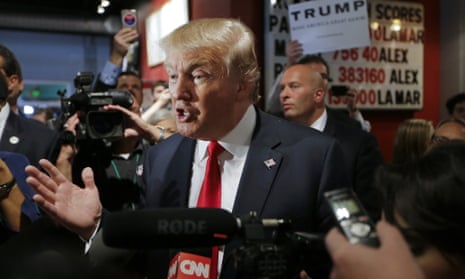Donald Trump’s hate speech against Latinos seems to be emboldening white Americans’ racism. For many, it may be hard to wrap their minds around the fact that that a reality TV star and failed businessman who characterized Mexican immigrants as the “most unwanted people,” calling them “criminals, drug dealers,” and “rapists”, was not only running for president, but is now polling well.
I can’t say I’m surprised.
A couple of weeks ago, while I was running errands in my neighborhood, a stranger asked me if I was “illegal”. Around 10 minutes earlier another stranger asked me if I spoke English. Both were white and one of them even called me “senorita.” Then, late last week, I was standing in line to use the ATM when a white man approached me cautiously, asking if I spoke English. He was lost and said he didn’t want to be in a “bad area” longer than he needed to. He was holding a King Taco cup in his hand. I’ve seen white guys like him at the neighborhood taco spot. Stay for the tacos, leave before you have to interact with Mexicans who aren’t serving you.
This is the world Trump wants when he says he’s going to “make America great again.” It’s the America of 1950s TV shows, where people of color don’t exist in the lives of white Americans unless they’re being served or entertained by them. This appears to be a world longed for by many, as a recent poll found that 47% of white Americans look upon Trump “favorably.”
I’ve lived in Los Angeles for 29 of my 30 years. As a light-skinned, biracial Latina in one of the most diverse and Mexican-centric cities in the nation, I have never been asked the type of questions I’m now fielding from white people. I’m not the only one experiencing an uptick in seemingly out-of-the-blue racist exchanges. Latina journalist Aura Bogado recently tweeted about a strange interaction at a grocery store. My father recently told me a white neighbor he’s been friendly with since moving into the neighborhood 15 years ago, casually inquired about his citizenship status. As the days go on, I hear more of these kinds of stories from Latino friends and family members.
White Americans can argue Trump is the all-American underdog, the anti-PC, shoot-from-the-hip politician they’ve been waiting for; that their support stems from an appreciation for someone willing to stand up for everything that once made America “great.” Yes, Trump is unabashedly American – in the way that racism and xenophobia are as American as apple pie. His demonization, dehumanization and push to further criminalize undocumented immigrants while having utilized their labor to build Trump Tower is also painfully American.
We’re seeing headlines from both conservative and liberal news sources, seemingly confused by Trump’s popularity and polling numbers. “Why is Trump so popular?” “Why do people support Donald Trump?” “Trump can’t actually win, can he?” He can win, and it’s because he’s utilizing a very dangerous tactic: he’s preying on white Americans’ fear of “the other.” In this case, the “other” is Mexican immigrants, who are here to take Americans’ jobs, sell their children drugs, and rape the white women in their lives.
Strangely, Trump is the only presidential candidate willing to discuss race head-on, but he’s approaching the subject by doing nothing more than tapping into Americans’ fears of “the end of white America,” when ethnic and racial minorities will comprise a majority of the US population. While it’s true that demographics are shifting, focusing on immigration is a lazy tactic, even while immigration flows are falling to their lowest level in at least two decades.
When media fails to call Trump’s “rants” what they truly are – hate speech – we move toward normalizing his racism and xenophobia, which emboldens others to behave similarly. As long as Trump has a platform and a microphone, people of color will be put in harm’s way. That can take the form of the type of racist interactions I’m experiencing – or violence.
When white brothers, Scott and Steve Leader, beat and urinated on a 58-year-old homeless Mexican man last month, they cited Trump as the reason why they did it. “Trump was right” about “deporting all these illegals”, they said. Trump responded by saying he would never “condone violence.” But when will Trump take responsibility for breeding hatred? And when will society – and the media – call Trump exactly what he is: a racist?
